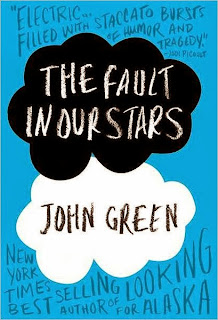Surviving cancer patient Hazel Grace Lancaster may have a second lease on life, but she’s not doing much in the way of actually living it until she meets Augustus Waters, another kid of the handsome and charming variety who has had his own brush with cancer. That’s the gist of it. Of course, there’s a great deal more that happens, in the form of many metaphorical pretensions and genuine moments of feeling, not to mention a trip to Amsterdam to meet a personal celebrity.
This is my first John Green book. I've been hearing a lot of buzz around this book -- some of it quite good and tear-drenched. Some of it highly critical of the forced moods and pseudo intellectual overtones of the book, and many cynically bringing up the question of whether or not these teenagers and their mannerisms can be believed.
(They can’t but it's something I could overlook -- after all, this is fiction.)

I’m normally wary of books reputedd to for their ability to wring tears from a stone, because it takes very little to get my waterworks running. I cry over everything, so that isn’t really an indication on whether or not something is actually genuinely good. It just means that at the very least I’m quite good at following narrative cues, and in The Fault in Our Stars, John Green is shameless in his abuse of them. There’s nothing subtle in his attempts to evoke his readers’ emotions. I don’t mean to belittle the feelings of people who have been deeply moved by this book -- after all, there have been many, and good for them. It’s just that sometimes I felt like I only teared up because I was supposed to cry, rather than feeling it burst forth from an unstoppable welling up of emotions.
It could be because I read Hazel’s voice as mechanical and flat, despite the highly charged events that happen to her. Maybe Green wanted to avoid an excess of sentimentality. A book where the protagonists are young cancer victims would be very much in danger of wallowing in it. It does help bring home the fact that Hazel is meant to have a maturity forced upon her by her illness. In her I read more of a cynical adult soldiering on than a young, terrified girl clinging to life. Not a bad thing. Not at all.
Except maybe when it comes to Augustus Waters. In him, you have Pretentious in spadefuls, and he is acknowledged to be so by the characters in the book itself. He dips a toe into manic pixie dream boy waters, saved from the depths only by the skin of his teeth. In him we have everything that makes teenagers irritating, but maybe it’s only irritating because we know we were never that smart or insightful as teenagers. He’s insufferable and charming at the same time, but always wholly unreal. I mean what kid uses “Whitmanesque” in a sentence? One I’d like to punch in the face.
The Fault in Our Stars is a book that ended up blurring around the edges and making my throat hurt a bit. It’s a book with little jokes and ideas that made me smile inwardly, and sometimes outwardly, too. It also summoned forth its fair share of heartilly meant eye rolls. I wouldn't say it's for everyone -- I’d imagine people who loved The Perks of Being a Wallflower would absolutely swallow this stuff up, because it has the same theme of teenagers being excessively self-aware in a world where everyone else is blind and stupid. (Sorry, I absolutely hated Perks. You might have noticed. This one was much less awful) I don't know if I would page through it again, but I don't regret picking this book up.
This book was just okay.



0 comments:
Post a Comment